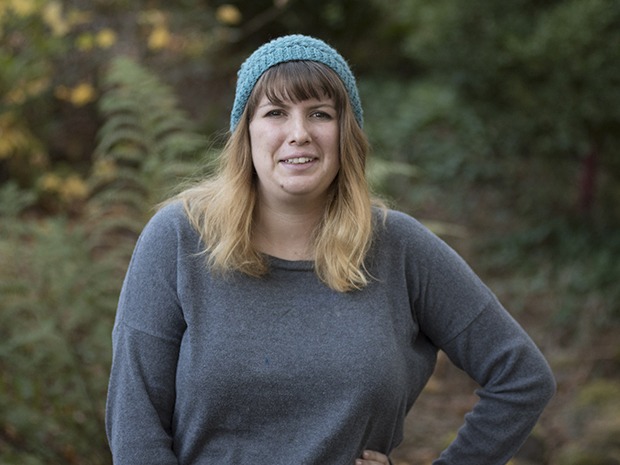Why Corban, and why psychology? Taylor Shaw shares her story

Taylor Shaw was perhaps the last person to realize that God was calling her to counseling. Her friends knew it from the way she listened to them, validated them, and encouraged them. The readers of the Hilltop News knew it from the witty yet heartfelt advice she offered in her column “Tay-ke It or Leave It.” But it took Taylor Shaw nearly two years at Corban to realize that she was called to pursue a degree in psychology and pre-counseling.
She’d come to Corban planning to major in elementary education. But as the deadline to officially apply for the ed program approached, Taylor felt an increasing anxiety. Still passionate about the reasons she’d chosen education in the first place—advocating for children, being the adult she wished she’d had when she was younger—Taylor realized that what initially drew her to education might serve her well in the field of counseling instead. “A lot of reasons why I was going into ed weren’t necessarily ed-specific,” she says. There were other fields where she could be a positive adult in a child’s life.
At first Taylor felt guilty for leaving the education department, especially after her professors had invested so much time in her. “I needed their approval—in a sense, their forgiveness,” she laughs. But as soon as she completed the paperwork to major in psychology and pre-counseling, the weight of anxiety she’d been feeling was gone.
Why Psychology?
“In hindsight, a lot of things were directing me toward counseling,” Taylor reflects, explaining that God had spent years teaching her “how listening can be a catalyst for healing.” She had learned from her own experience and from the experiences of others how powerful guilt and shame can be, and how empathy and a listening ear can help restore and bring healing.
“In my high school years, I dealt with some really, really severe depression and suicidal-ness,” Taylor shares. “For a long time, I felt guilty about having the nerve to be depressed.” She remembers thinking, “I have Jesus to be thankful for—I am not allowed to feel this way!” But her junior year, through the words of a mentor, she realized that her suffering was not a cause for shame or guilt, that it wasn’t a sign that she lacked faith, and that her own experiences could help cultivate increased empathy for others.
The more she interacted with people at Corban, the more she realized others were struggling with the same guilt and shame she had felt in high school. They were being asked, “Have you prayed about it?” as if having a healthy prayer life and having depression were mutually exclusive. Taylor knew from experience that they weren’t. “There’s this idea that if your faith is strong enough, you won’t struggle,” she says, “but in some of the most tumultuous episodes of depression, my faith has been the strongest.”
Because she had walked through depression herself, Taylor felt an increased sense of empathy for others. “That empathy toward people struggling with their mental health is what guided me toward a helping profession.”
Although she didn’t realize her calling until her sophomore year, Taylor by no means counts her first two years a mistake. Her desire to pursue education is, in fact, what led her to Corban in the first place.
Why Corban?
When she first began the process of choosing a college, Taylor had three main criteria: she was looking for a school that was out of state (she’d grown up in Southern California), had a quality education program, and required a Christian faith commitment. “I wanted to be in a situation where I would be able to grow in my faith and be in a community of believers, because a lot of what really encouraged me in my faith was being in community.”
Taylor only applied to three schools, and of the three, Corban remained at the top of her list—even though she hadn’t yet set foot on campus. “My mom didn’t let me officially accept until we visited,” she laughs, but she knew Corban was where she was meant to be. It also helped that Corban offered a Loan Repayment Assistance program. “I wanted to go to a four-year college, but taking on debt was intimidating,” Taylor shares. “The LRAP made taking on all the loans seem less scary. It’s a lot easier to step out on the line with a safety net.”
Confident that God directed her steps toward Corban, Taylor says, “The incredible thing is, I feel coming to Corban as an ed major was by no means a mistake, because of the people I was able to meet, and because the ed major is why I came to Corban in the beginning. It was very necessary, for the growth it inspired.”
Taylor is now in her junior year at Corban, and even as she prepares to enter the field of psychology and counseling, she finds ways to be a good listener and practice empathy with the people around her. “I love knowing people,” she says, and laughs because she thinks it sounds cliché, but it’s true. Whether you come to her in person or submit a question to her advice column in the Hilltop, Taylor will meet you with the patience, empathy, and insight of someone who knows what struggle feels like, but who also knows what faith feels like. She’ll meet you right where you’re at, and she’ll listen.









